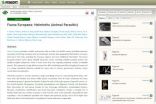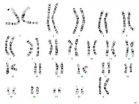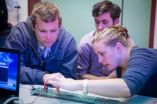(Press-News.org) In an analysis of genetic information among more than 87,000 men, a global team of scientists says it has found 23 new genetic variants – common differences in the genetic code -- that increase a man's risk for prostate cancer. The so-called "meta-analysis," believed to be the largest of its kind, has revealed once hidden mutations among men in a broad array of ethnic groups comprising men of European, African, Japanese and Latino ancestry.
The meta-analysis combined information from smaller studies, according to William B. Isaacs, Ph.D., a genetic scientist at the Brady Urological Institute at the Johns Hopkins University School of Medicine. "There is a power in numbers that helped us find new variants that were only hinted at in smaller study populations, especially among minority men, and as we found the same variants across several populations, the evidence became stronger that they were definitively linked to prostate cancer," Isaacs said.
To help build the number of samples for the current study, described online Sept. 14 in Nature Genetics, Isaacs and Alan Partin, M.D., Ph.D., Brady Urological Institute director, contributed blood and tissue samples and data from 800 African-American men (400 with prostate cancer and 400 cancer-free) treated at Johns Hopkins to the study. All told, the samples included information on 43,303 prostate cancer patients and 43,737 men without prostate cancer.
Scientists at the Institute of Cancer Research and Royal Marsden National Health Services Foundation Trust in London, UK, and the University of Southern California led the analysis, which scanned more than 10 million areas of the genome where one genetic building block of DNA was switched for another, referred to as genetic variants, or more specifically, single-nucleotide polymorphisms (SNPs).
The team then compared the scanned genome regions of prostate cancer patients with prostate cancer-free men to find the 23 new SNPs they now link to prostate cancer. Together with 76 previously discovered SNPs, the variants account for one-third of the inherited risk for prostate cancers in men of European descent. Because the variants are inherited commonly among populations, they can appear in men with little or no family history of prostate cancer.
"Inheriting any single one of these genetic variants has only a small effect of prostate cancer risk," says Partin. "However, a subset of men will inherit many of these variants, putting them at substantially increase risk for the disease, from three to six times the population average. Men with these risk levels may benefit from disease screening at earlier ages."
Isaacs says that men with a family history of prostate cancer are already encouraged to be screened at an earlier age, "but family history may be difficult to pin down."
He suggests that the identification of prostate cancer-related SNPS could serve as a "molecular family history" to enable better screening guidelines and therapies.
Isaacs says all 23 SNPs were located in non-protein encoding regions of DNA – genetic material that is not a blueprint for a specific protein product – suggesting that the SNPs may be important in regulating genes rather than making proteins. Some of the newly identified SNPs have been previously linked to cancer.
INFORMATION:
Isaacs is the William Thomas Gerrard, Mario Anthony Duhon and Jennifer and John Chalsty Professor of Urology and professor of oncology at the Johns Hopkins University School of Medicine, and a member of the Johns Hopkins Brady Urological Institute and Kimmel Cancer Center. Partin is the professor of urology, oncology and pathology at the Johns Hopkins University School of Medicine and the David Hall McConnell Director of Urology and urologist in chief for the Department of Urology and Oncology.
Funding for the study was provided by the U.S. Department of Defense, National Institutes of Health's National Cancer Institute, Cancer Research UK, Prostate Cancer UK, the EU, as well as Patrick Henry, P. Kevin Jaffe, and The Peter Jay Sharpe Foundation.
A full list of scientists who contributed to the study can be found at http://www.nature.com/ng/journal/vaop/ncurrent/full/ng.3094.html#acknowledgments.
On the Web:
Nature Genetics: DOI: 10.1038/ng.3094
Media Contacts:
Vanessa Wasta, 410-614-2916, wasta@jhmi.edu
Amy Mone, 410-614-2914, amone@jhmi.edu
Large study reveals new genetic variants that raise risk for prostate cancer
2014-09-17
ELSE PRESS RELEASES FROM THIS DATE:
Babies learn words differently as they age, researcher finds
2014-09-17
COLUMBIA, Mo. – Research has shown that most 18-month-olds learn an average of two to five new words a day; however, little is known about how children process information to learn new words as they move through the preschool years. In a new study, a University of Missouri researcher has found that toddlers learn words differently as they age, and a limit exists as to how many words they can learn each day. These findings could help parents enhance their children's vocabularies and assist speech-language professionals in developing and refining interventions to help children ...
Contributions on Fauna Europaea: Data papers as innovative model on expert involvement
2014-09-17
Fauna Europaea started in 2000 as an EC-FP5 four-year project, delivering its first release in 2004. After 14 years of steady progress and successful participations in several EC projects, as a part of the EC-FP7 European Biodiversity Observation Network project (EU BON), to increase the general awareness of the work done by the contributors and to extend the general dissemination of the Fauna Europaea results, the Biodiversity Data Journal has applied its novel e-Publishing tools to prepare data papers for all 56 major taxonomic groups.
Fauna Europaea provides a public ...
Big surprises can come in small packages
2014-09-17
Astronomers using the NASA/ESA Hubble Space Telescope have found a monster lurking in a very unlikely place. New observations of the ultracompact dwarf galaxy M60-UCD1 have revealed a supermassive black hole at its heart, making this tiny galaxy the smallest ever found to host a supermassive black hole. This suggests that there may be many more supermassive black holes that we have missed, and tells us more about the formation of these incredibly dense galaxies. The results will be published in the journal Nature on 18 September 2014.
Lying about 50 million light-years ...
A link between Jacobsen syndrome and autism
2014-09-17
SAN DIEGO, Calif. (Sept. 17, 2014)— A rare genetic disorder known as Jacobsen syndrome has been linked with autism, according to a recent joint investigation by researchers at San Diego State University and the University of California, San Diego. In addition to suggesting better treatment options for people with Jacobsen syndrome, the finding also offers more clues into the genetic underpinnings of autism.
Jacobsen syndrome affects approximately 1 in 100,000 people, according to the National Institutes of Health. It occurs in a person when there is a deletion at the end ...
Lack of facial expression leads to perceptions of unhappiness, new OSU research shows
2014-09-17
CORVALLIS, Ore. – People with facial paralysis are perceived as being less happy simply because they can't communicate in the universal language of facial expression, a new study from an Oregon State University psychology professor shows.
The findings highlight the important role the face plays in everyday communication and indicates people may hold a prejudice against those with facial paralysis because of their disability, said Kathleen Bogart, an assistant professor of psychology in the College of Liberal Arts at Oregon State University.
"People are more wary and ...
Entrepreneurs aren't overconfident gamblers
2014-09-17
Leaving one's job to become an entrepreneur is inarguably risky. But it may not be the fear of risk that makes entrepreneurs more determined to succeed. A new study finds entrepreneurs are also concerned about what they might lose in the transition from steady employment to startup.
In Entrepreneurship and Loss-Aversion in a Winner-Take-All Society, Professor John Morgan at UC Berkeley's Haas School of Business and co-author Dana Sisak, assistant professor at the Erasmus University Rotterdam, focused on the powerful impact of loss aversion.
Loss aversion, or the fear ...
Oxides discovered by CCNY team could advance memory devices
2014-09-17
The quest for the ultimate memory device for computing may have just taken an encouraging step forward. Researchers at The City College of New York led by chemist Stephen O'Brien have discovered new complex oxides that exhibit both magnetic and ferroelectric properties.
Combining both properties is very exciting scientifically for the coupling that can occur between them and for the devices that might ultimately be designed, in logic circuits or spintronics. Combining these two properties in a single material, however, has proved difficult until now.
Using an innovative ...
Engineers develop algorithms to switch out and recharge battery modules in electric cars
2014-09-17
Imagine being able to switch out the batteries in electric cars just like you switch out batteries in a photo camera or flashlight. A team of engineers at the University of California, San Diego, are trying to accomplish just that, in partnership with a local San Diego engineering company.
They have developed smaller units within the battery, called modules, and a battery management system that will allow them to swap out and recharge the modules, rather than swapping out the whole battery, which is cumbersome and requires large, heavy equipment. They recently presented ...
US health system not properly designed to meet needs of patients nearing end of life, says IOM
2014-09-17
WASHINGTON -- The U.S. health care system is not properly designed to meet the needs of patients nearing the end of life and those of their families, and major changes to the system are necessary, says a new report from the Institute of Medicine. The 21-member committee that wrote the report envisioned an approach to end-of-life care that integrates traditional medical care and social services and that is high-quality, affordable, and sustainable. The committee called for more "advance care planning" for end-of-life by individuals, for improved training and credentialing ...
First blood test to diagnose depression in adults
2014-09-17
CHICAGO --- The first blood test to diagnose major depression in adults has been developed by Northwestern Medicine® scientists, a breakthrough approach that provides the first objective, scientific diagnosis for depression. The test identifies depression by measuring the levels of nine RNA blood markers. RNA molecules are the messengers that interpret the DNA genetic code and carry out its instructions.
The blood test also predicts who will benefit from cognitive behavioral therapy based on the behavior of some of the markers. This will provide the opportunity for more ...




